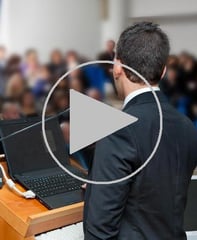Published on
Listen Up! Activating Voice through CAEL Innovation Fellows

Imagine a world where adult learners have a real say in shaping their educational experiences and professional paths. A world where their unique perspectives and needs are not only heard but valued and integrated into the design of learning environments and workforce solutions. Activating voice leverages adult learners’ agency and empowers them to express their thoughts, experiences and needs in ways no others can to shape their learning environments and professional trajectories. By amplifying the voice of adult learners, we honor their unique perspectives and tap into a wellspring of insights that can drive meaningful change and improve outcomes.
In my experience, when you activate learner voice around a proposed solution, you quickly learn that sometimes the exciting new tech or policy solution you love isn’t what most adult learners are looking for, so they don’t adopt it. If instead you instead encourage and nurture the practices that give your learners a voice, they become partners in creating novel approaches that you can then test to identify promising solutions to develop. Because you engaged learners throughout the process, you are far likelier to have a successful release and a more targeted change management strategy. The time you put into activating the learner’s voice will pay off as adult learners succeed and the adoption rates for your solutions soar.
Activating voice goes beyond simply collecting feedback. Co-creating the solutions that will drive meaningful change and improve outcomes entails a holistic and empathetic understanding of adult learners’ preferences, aspirations and challenges. Such a mindset recognizes the inherent value of their lived experiences and acknowledges that their perspectives are essential in designing educational programs, curricula and learning environments. This framework truly meets adult learners’ needs by addressing the problems and challenges they are facing right now, while accounting for future outcomes like career mobility. When learners have a seat at the table, their voices become sustainable catalysts for innovation, enabling institutions and faculty to tailor their offerings and practices in a way that resonates more deeply with the individuals they serve.
You might be wondering, “How do I do this? Why would busy adult learners want to participate? And how can I ensure their inputs are targeted and helpful?” These are valid and realistic questions. Traditional methods like spontaneous focus groups and lengthy surveys can take time to capture the nuanced insights of adult learners. That’s where human-centered design (HCD) fellowships come into play. HCD fellowships empower a diverse and representative group of adult learners to provide relevant and targeted feedback. Activating voice through the HCD framework enables learners to express their preferences, identify areas of improvement and propose innovative solutions. This active involvement cultivates a sense of ownership and investment, fostering a positive learning environment that encourages persistence and promotes a sense of belonging.
A structured HCD fellowship offers a powerful methodology and curriculum that allows adult learners to engage in a more accessible and impactful co-design conversation with you about the learning experience. When learners are empowered to provide feedback and contribute to the educational program design, the learning experience becomes more engaging, relevant and meaningful. The result: You gain a more deeply nuanced understanding ofadult learners’ needs in your learning community, empowering you to develop more effective interventions and solutions they are more likely to adopt. A win-win!
CAEL is seeking to partner with colleges, universities and employers to test-drive an HCD fellowship, the CAEL Innovation Fellows (CIF). Fellows will gain a sense of agency and ownership over their educational and professional journeys, become advocates for their peers and help to activate learner voices by advising current and proposed projects intended to serve adult learners.
We are designing the CIF as a cohort model configured to activate adult learners’ voices by practicing those innovations and HCD-thinking competencies most likely to impact their learning environments directly. Our fellows will complete a targeted curriculum centered on HCD principles. There will be multiple opportunities to co-design and practice providing feedback on real-time university and employer initiatives in a collaborative and supportive learning environment that encourages experimentation, exploration and innovation. Staff and faculty who wish to co-design with the fellows are welcome, too!
By contributing their insight through the CIF program, fellows will gain valuable HCD competencies as they shape projects through real-time advocacy for their peers. Through a targeted curriculum and collaborative learning environment, CAEL Innovation Fellows will have the opportunity to co-design and provide feedback on emerging postsecondary initiatives. This hands-on approach ensures learners’ voices are heard and actively incorporated into the decision-making processes. They will model a culture of inclusivity and co-creation in which every individual feels empowered to contribute their ideas and suggestions to the cause of adult learning excellence sustained by continuous improvement.
If you’re ready to embark on a journey of meaningful change and tap into the invaluable insights of adult learners, join us on this exciting path. Keep an eye out for updates on the CAEL website (cael.org) and be part of the movement that recognizes and celebrates the power of learner and earner voices. Together, we can create learning environments that truly meet the needs of adult learners and propel them toward education and career success.
Author Perspective: Association



